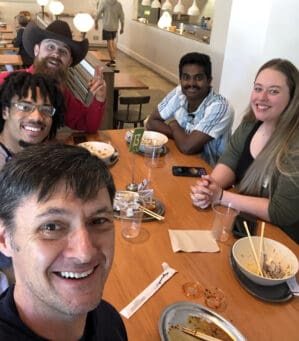Professor

Research Interest: Mechanisms of Gammaherpesvirus Pathogenesis
Ph.D.: Vanderbilt University, Nashville, Tennessee
Postdoctoral: Emory University School of Medicine, Atlanta, Georgia
Phone: 501-526-7141
Fax: 501-686-5359
Email: JCForrest@uams.edu
We currently have space for 1 new student. Our lab is available for all three rotations.
Current Graduate Students
Steven Murdock (MBIM)
Chandra Penthala (MD/PhD)
Sheldon Zeltner (MBIM)
Postdoctoral Fellow
Shana Owens
Research Description
Virology! Cancer biology! Immunology! Systems biology! Gammaherpesviruses are cancer-causing viruses that infect the majority of humans. We are working to determine functions of viral proteins in infection and disease, identify host factors that block viral infection and prevent virus-driven cancers, and understand immune responses to chronic viral infections. Our major goal is to define the complex relationship between gammaherpesviruses and their hosts. To do so, we use both tissue culture and mouse models of infection. We employ many different techniques, including flow cytometry, fluorescence microscopy, bacterial genetics, viral genetics, in vivo reporter systems, immunologic assays, basic biochemistry, proteomics, transcriptomics, and CRISPR/Cas9 screens and knockouts. PLUS, we get to do cool science and figure out how stuff works!

Current Projects
1. Defining how host tumor suppressor p53 restricts gammaherpesvirus infection and tumorigenesis and understanding how gammaherpesvirus co-infection with malaria parasites causes lymphoma. (Topics: Cancer biology and infectious disease research)
2. We “humanized” a mouse virus, and we are now using this virus to define how a cancer-causing human virus, Kaposi sarcoma-associated herpesvirus, evades the immune response. (Topics: Immunology, viral pathogenesis, and genetics)
3. Developing vaccines against gammaherpesviruses – we patented a technique for making “dead” viruses that maintain antigenic epitopes. (Topics: Immunology, genetics, and biochemistry)
4. Defining the basic biology of how gammaherpesviruses infect and replicate in target cells – we recently completed a CRISPR/Cas9 screen and found lots of cool stuff to pursue! (Topics: Cell biology, molecular virology, and biochemistry)
Current Funding Sources
National Cancer Institute R01 CA167065
National Cancer Institute R01 CA167065S
National Institute of Allergy and Infectious Diseases R01 AI181787
Recent Student Publications
- Salinas, E., Gupta, A., Sifford, J.M., Oldenburg, D.G, White, D.W., and Forrest, J.C. Conditional Mutagenesis in vivo Reveals Cell Type- and Infection Stage-Specific Requirements for LANA in Chronic MHV68 Infection. PLOS Pathog. Jan 24;14(1):e1006865. 2018. PMCID: PMC5798852
- Owens, S.M., Oldenburg, D.O., White, D.W., Forrest, J.C. Deletion of Murine Gammaherpesvirus Gene M2 in AID-Expressing B Cells Impairs Host Colonization and Viral Reactivation. J. Virol. 2020 Dec 9;95(1):e01933-20. doi: 10.1128/JVI.01933-20. PMCID: PMC7737732
- Gupta, A., Owens, S.M., Oldenburg, D.G., White, D.W., and Forrest, J.C. Lytic Replication and Reactivation from B Cells Is Not Required for Maintaining Gammaherpesvirus Latency in vivo. J Virol. 2022 Jun 22;96(12):e0069022. doi: 10.1128/jvi.00690-22. Epub 2022 Jun 1. PMCID: PMC9215232
- Bland WA, Mitra D, Owens S, McEvoy K, Hogan CH, Boccuzzi L, Kirillov V, Meyer TJ, Khairallah C, Sheridan BS, Forrest JC, Krug LT. A replication-deficient gammaherpesvirus vaccine protects mice from lytic disease and reduces latency establishment. NPJ Vaccines. 2024 Jun 24;9(1):116. doi: 10.1038/s41541-024-00908-x. PMCID: PMC11196663
